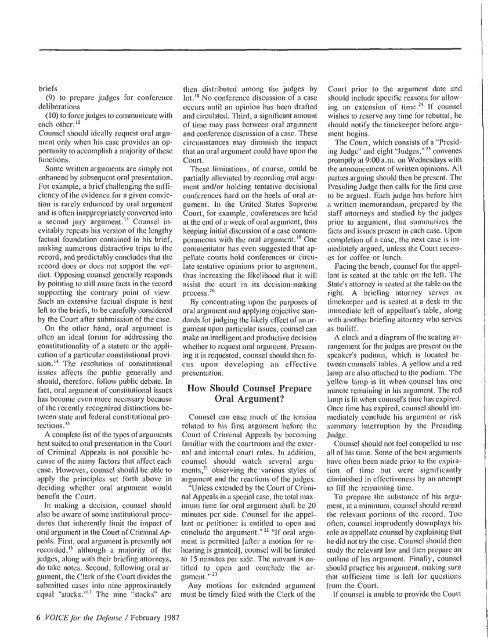Robert Richard Thornton - Voice For The Defense Online
Robert Richard Thornton - Voice For The Defense Online
Robert Richard Thornton - Voice For The Defense Online
You also want an ePaper? Increase the reach of your titles
YUMPU automatically turns print PDFs into web optimized ePapers that Google loves.
iefs(9) to prepare judges for conferencedeliberations(10) to force judges to cummunicate witheach other.12Counsel should ideally request oral argumentonly when his case provides an opportunityto accomplish a majority of thesefunctions.Some written arguments are simply notenhanced by subsequent oral presentation.<strong>For</strong> exmple, a brief challenging the sufficiencyof the evidence for a given convictionis rarely enhanced by oral argumentand is often inappropriately converted intoa second jury argument." Counsel inevitablyrepeats his version of the lengthyfactual foundation containe'in his brief,making numerous distractive trips to therecord, and predictably concludes that therecord does or does not support the verdict.Opposing counsel generally respondsby pointing to still more facts in the recordsupporting the contrary point of view.Such an extensive facbal dispute is bestleft to the briefs, to be carefully consideredby the Court after submission of the case.On the other hand, oral argument isoften an ideal forum for addressing theconstitutionality of a statute or the applicationof a particular constitutional provision.14<strong>The</strong> resolution of constitutionalissues affects the public generally andshould, therefore, follow public debate. Infact, oral argument of constitutional issueshas become even more necessary becauseof the recently recognized distinctions betweenstateand federal constitutional protection~.'~A complete list of the types of argumentsbest suited to oralpresentation in the Courtof Criminal Appeals is not possible becauseof the many factors that affect eachcase. However, counsel should be able toapply the principles set forth above indeciding whether oral argument wouldbenefit the Court.In making a decision, counsel shouldalso be aware of some institutional proceduresthat inherently limit the impact oforal argument in the Court of Criminal Appeals.First, oral argument is presently notrecorded,16 although a majority of thejudges, along with their briefing attorneys,do take notes. Second, following oral argument,the Clerk of the Court divides thesubmitted cases into nine approximatelyequal "stacks."17 <strong>The</strong> nine "stacks" arethen distributed among the judges bylot.lS No conference discussion of a caseoccurs until an opinion has been draftedand circulated. Third, a significant amountof time may pass between oral argumentand conference discussion of a case. <strong>The</strong>secircumstances may diminish the impactthat an oral argument could have upon theCourt.<strong>The</strong>se limitations, of course, could bepartially alleviated by recording oral argumentandlor holding tentative decisionalconferences hard on the heels of oral argument.In the United States SupremeCourt, for example, conferences are heldat the end of a week of oral argument, thuskeeping initial discussion of a case contemporaneouswith the oral argument.19 Onecommentator has even suggested that appellatecourts hold conferences or circulatetentative opinions prior to argument,thus increasing the likelihood that it willassist the court in its decision-makingprocess.20By concentratiw .. upon the Durposes oforaiargulntmt and npiiying objcc&e standardsforjudging the likcly effect of an argumentupon particular issues, counsel canmake an intelligent and productive decisionwhether to request oral argument. Presumingit is requested, counsel should then focusupon developing an effectivepresentation.How Should Counsel PrepareOral Argument?Counsel can ease much of the tensionrelated to his first argument before theCourt of Criminal Appeals by becomingfamiliar with the courtroom and the externaland internal court rules. In addition,counsel should watch several arguments:"observing the various styles ofargument and the reactions of the judges."Unless extended by the Court of CriminalAppeals in a special case, the totalmaximumtime for oral argument shall be 20minutes per side. Counsel for the appellantor petitioner is entitled to open andconclude the arg~ment."'~ "If oral argumentis permitted [after a motion for rehearingis granted], counsel will be limitedto 15 minutes per side. <strong>The</strong> movant is entitledto open and conclude the argume~~t."~'Any motions for extended argumentmust be timely filed with the Clerk of theCourt prior to the argument date andshould include specific reasons for allowingan extension of time." If counselwishes to reserve any time for rebuttal, heshould notify the timekeeper before argumentbegins.<strong>The</strong> Court, which consists of a "PresidingJudge" and eight "Judges,"= convenespromptly at 9:00 a.m. on Wednesdays withthe announcement of written opinions. AILparties arguing should then be present. <strong>The</strong>Presiding Judge then calls for the first caseto be argued. Each judge has before hima written memorandum, prepared by thestaff attorneys and studied by the jndgesprior to argument, that summarizes thefacts and issues present in each case. Uponcompletion of a case, the next case is inmediatelyargued, unless the Court recessesfor coffee or lunch.Facing the bench, counsel for the appellantis seated at the table on the left. <strong>The</strong>State's attorney is seated at the table on theright. A briefing attorney serves astimekeeper and is seated at a desk to theimmediate left of appellant's table, alongwith another briefing attorney who servesas bailiff.A clock and a diagram of the seating arrangementfor the judges are present on thespeaker's podium, which is located betweencounsels' tables. A yellow and a redlamp are also attached to the podium. <strong>The</strong>yellow lamp is Lit when counsel has oneminute remaining in his argument. <strong>The</strong> redlamp is lit when counsel's time has expired.Once time has expired, counsel should immediatelyconclude his argument or risksummary interruption by the PresidingJudge.Counsel should not feel compelled to useall of his time. Some of the best argumentshave often been made prior to the expirationof time but were significantlydi~inished in effectiveness by an attemptto fill the remaining time.To prepare the substance of his argument,at a minimum, counsel should rereadthe relevant portions of the record. Toooften, counsel imprudently downplays hisrole as appellate counsel by explaining thathe did not try the case. Counsel should thenstudy the relevant law and then prepare anoutline of his argument. Finally, counselshould practice his argument, making surethat sufficient time is left for questionsfrom the Court.If counsel is unable to provide the Court6 VOICE for rlze <strong>Defense</strong> / February 1987

















